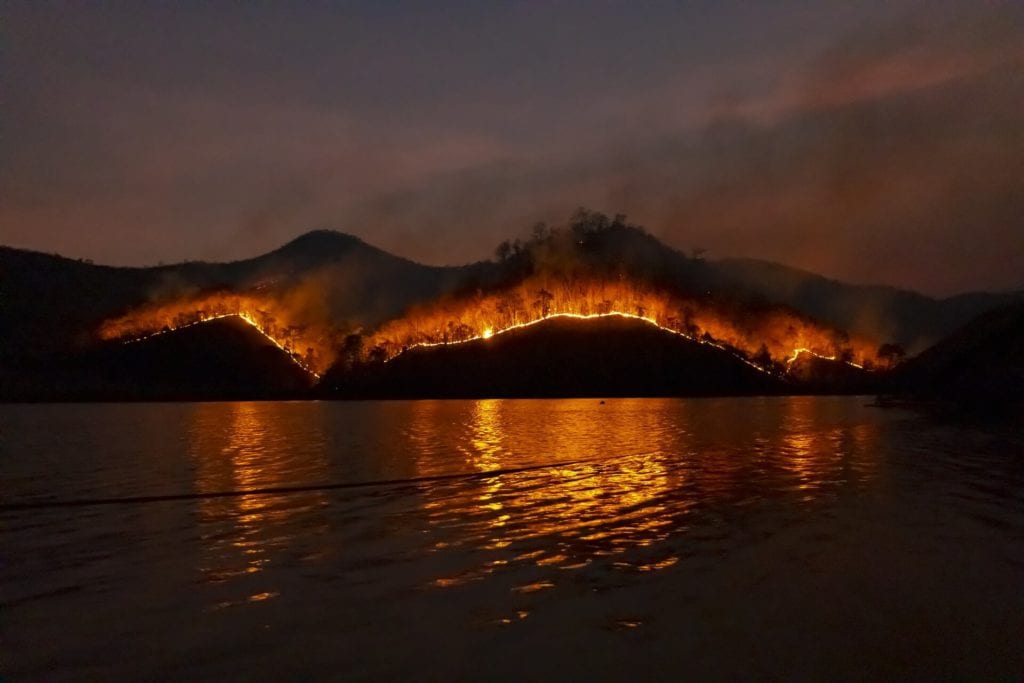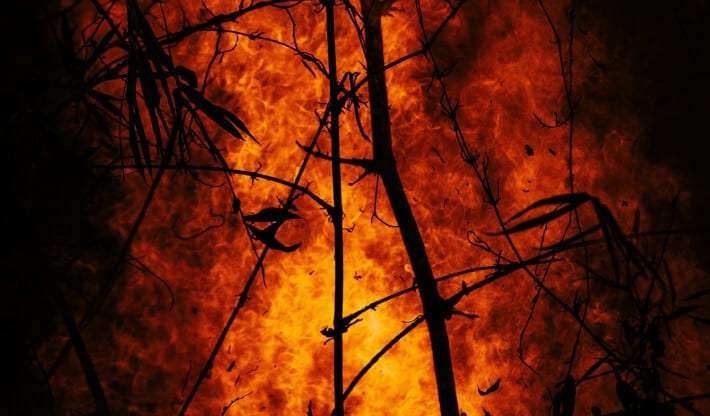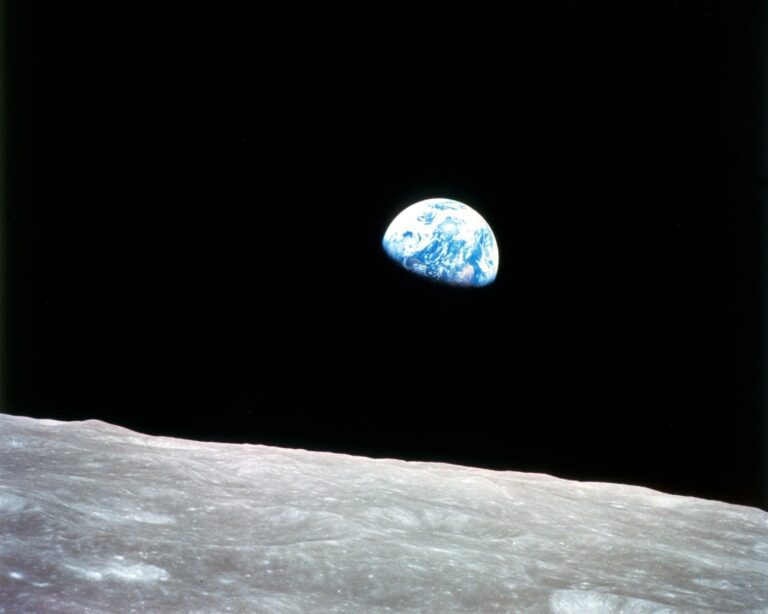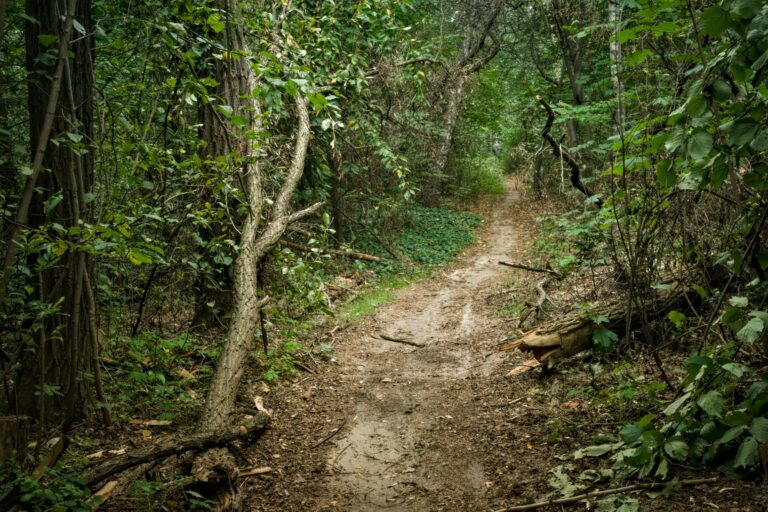Every morning I step outside my home in New South Wales, Australia, to check if it’s safe to open the doors and windows. What I find is burnt orange dawns, blood red sunsets, searing wind, and palls of smoke that blot out the sky. For weeks the smoke from nearby fires has been so bad that the air quality in my small town is worse than in the world’s most polluted cities. Often I wake with a dry, sore throat from breathing in the smoke as I slept. On the worst of days, the air smells of ash and death.
Two months back, when a fire got within a mile and a half of our home, authorities told my partner and me to prepare to evacuate. But my partner said he wasn’t going anywhere. He has a serious medical condition and wasn’t well enough to travel. Besides, he explained calmly, he was in retreat and wasn’t about to break it. The fire would just have to burn him up, he said without a hint of melodrama. Luckily, the fires did not get any closer—but they’re still burning.
Along with the acrid smoke, we breathe in daily distress.
Elsewhere in Australia, tornadoes of fire still careen across a bone-dry landscape, cities choke on smoke and wither under record-breaking heat, soot blackens the white sand beaches, and birds fall from the sky dead. Half a billion animals have been burned alive, and nearly as many are starving due to drought. Hundreds of homes have turned to ash, and at least 23 people are dead and more are missing. There have always been periods in history, and in our lives, when the ups and downs of samsara take a steep spiral downwards, when we feel more stressed, sad, or anxious than normal. But this devastation is not business as usual. It’s not even samsara as usual. This is something else altogether; our darkest nightmares have become real. We are living in a kind of hell.
Practice for a Burning World
For many Buddhists here, the calm and stillness that come from meditation have been tested by the immense suffering of people, animals, and nature. Even those with significant meditation experience are finding this moment deeply challenging. Those who are new to meditation practice are understandably finding it impossible to sit and find ease. They may think it impossible to respond as my partner did, whose deep renunciation cannot be shaken, not even by wildfires. Along with the acrid smoke, we breathe in daily distress. Our tolerance for those whose decades of inaction on climate change have led to this catastrophe has burnt to cinders. What is left is mere ash and yet another fire, the fire of anger. Many are asking: What can Buddhists do in the face of this? How can I meditate while the world literally burns around me?

With such desperate need in the world around them, many of my Buddhist peers’ practice hangs on by a thread. A number of them have stopped meditating altogether. For some this is just temporary, while they step up and do what they can in this time of crisis. Yet I fear that some of them will never regain their confidence in the many personal and social benefits of meditation. The intense suffering of the external world is turning their attention outward, overshadowing the importance of looking inward, of inner transformation. Their practice is cut; they have mistaken ordinary kindness with ultimate bodhicitta, the awakened compassionate mind.
Every Australian—Buddhist or not—has asked: “What can we do to help?” Many have dug deep. They are all helping how they can––by actively fighting fires, by donating to firefighting services, by volunteering with wildlife rescue organizations, or by giving to those who’ve lost homes and livelihoods. I am moved by how brave, kind, and generous Australians can be, but I also find myself worried for their long term well-being. Without the very practice that equips them to deal with the suffering of the world, how will they cope, not only with this terrible moment but in the long term?
Give support to those who are suffering, yes, but we must also sit. Help and then sit. Sit and then help.
This is why when my fellow Buddhists ask “What can we do to help?” I respond: We should do whatever we can to alleviate the suffering of others while maintaining our meditation practice. It should not be either/or—yet another dualistic choice that is characteristic of samsara, a result of not understanding our interconnected reality. It makes no sense to abandon the one thing that provides resilience in the face of pain and suffering at the very time we need that resilience most. Even if we were willing to abandon our own chance for resilience, it is unkind if not cruel to rob others of any useful example we might have set, any inspiration we might have been to those around us to take up meditation themselves.
Deep Transformation
Meditation better equips us to help others in times of crisis by making us less prone to negative or harmful emotions like anger and hatred. I believe that, with its emphasis on emptiness and impermanence, meditation severs anti-social behaviors like greed, selfishness, and bigotry at the root. By transforming ourselves through meditation practice we affect a broader social change by ensuring that all our actions are helpful. By transforming ourselves, we transform the world, making it a saner, more compassionate place. Without meditation there is only fleeting, partial “compassion” prone to bias, which is not really compassion at all. Meditation is true compassion, lasting and unbiased.
This is what we as Buddhists can do in times of crisis: we can meditate. It is our responsibility and obligation.
To drop meditation in times of crisis is like watering a plant in a basement. The plant will survive for a while, but in the end it will die from lack of light.
Even while the world literally burns around us we must sit. We must find the calm and stillness that leads to the flowering of unbridled compassion; only then will we actually know how to help in meaningful, lasting ways. This is the true revolution we need. Fight fires, yes, but we must also sit. Rescue animals, yes, but we must also sit. Give support to those who are suffering, yes, but we must also sit. Help and then sit. Sit and then help. These two should always be together.
To drop meditation in times of crisis is like watering a plant in a basement. The plant will survive for a while, but in the end it will die from lack of light. The plant is our chance for enlightenment in this lifetime, the sun is meditation, and the water is ordinary acts of kindness. Helping others in practical ways will keep us going for a while, but eventually we’ll burn out; our kindness will wither, as will the likelihood of realization.
Kindness and meditation together lead to the flowering of bodhicitta and enlightenment. We need that enlightenment to save the world. This is why my partner refuses to break retreat, fires or not. The wish to awaken for the sake of others is his primary concern.
Sit and help. Help and sit. This is what it is to be a Buddhist, especially a Buddhist in hell.
This article was originally published in Tricycle. It is reprinted here with permission.








